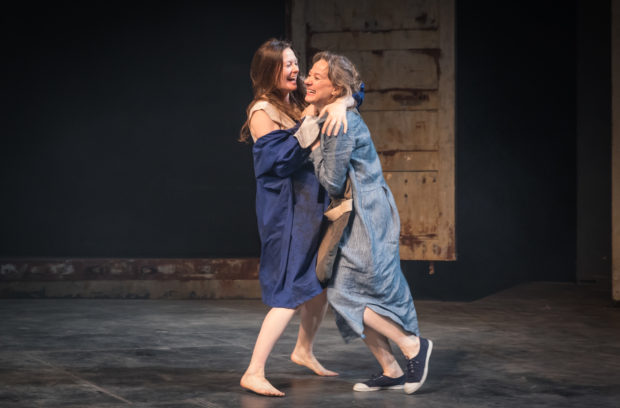You have no items in your cart. Want to get some nice things?
Go shopping
There is a striking shared lexicon that unites fans of Elena Ferrante’s Neapolitan Quartet: they will routinely speak of how they “devoured” the books; how “immersive” the experience was; how – yes – they were “impossible to put down”. This is not all to denigrate them; indeed, we have previously written glowingly about the series. It is merely to note that there is something extraordinary, especially for a work of literary fiction, about the way the books are consumed. As Joanna Biggs wrote in the LRB: “Ferrante’s writing seems to say something that hasn’t been said before – it isn’t easy to specify what this is – in a way so compelling its readers forget where they are, abandon friends and disdain sleep.” This new stage adaptation of the novels – adapted by Jumpy writer April de Angelis – appeals to same kind of maximalism, splitting the material into two shows across five hours.
From the minute the lights went out, there was a kind of collective rapture. Jon Nicholls’s mesmerising sound design, aided by opera music, transports us instantly to war-torn Naples. The cycle – if two plays makes a cycle – charts a lifelong friendship from childhood to their elderly years, battling political disputes, class division, violence, marriage, love affairs and motherhood along the way.
We first meet Lila (Catherine McCormack) and Lenu (Niamh Cusack) in the childhood years of their friendship, talking about their dolls, Tina and Nu, and beginning their adventure together. From the moment they meet, Lila is an intelligent, headstrong, adventurous spirit – perhaps even, at first glance, fearless. Lenu, in contrast, is a quieter personality, somewhat needy and fearful of consequences but ultimately willing to go along with Lila’s whims. Costume designer Soutra Gilmour dresses them in cheap, cotton dresses, indicative of their poverty; in these horrific conditions, these two girls are each other’s only beacon of hope.
Then we flash forward sixty years. Lenu is being visited by Lila’s son Gennaro, looking for his missing mother; Lenu then reflects wistfully on their tempestuous friendship. Director Melly Still handles the temporal shifts with an incredibly confident hand – and so, sure enough, we are soon back in the girls’ childhood, immersing ourselves again in their early war-torn world. With violence everywhere, they’re desperate to leave – in particular Lila, who sees writing a book, The Blue Fairy, as her ticket out of her neighbourhood. She has more intelligence than any of her peers at school but her family’s poverty causes her immense problems. Between her father’s opposition to women staying in education, and her mother’s concern that Lila might embarrass the son of one of their creditors by excelling above him in school, she is trapped in the poverty of Naples. Although Lenu doesn’t have the same aptitude that Lila has, she is allowed to stay in school, learning Latin. It’s at this point you see their economic status begin to shift. Lenu is in education; Lila is working in her father’s shoe store.
As they age into their late teen years, gang crime becomes more and more endemic. Lila has given up on reading, claiming “it gives me a headache”, while Lenu is in a relationship with her neighbour Antonio (Justin Avoth), even though her heart really belongs to Nino (Toby Wharton). It’s not long before Lila is married in an abusive and loveless relationship to Stefano (Jonah Russell), a local boy with connections to the gangster family of the neighbourhood, the Solaras. The day she said “I do” and realised the sort of man she married was the same day that her initial fieriness died away. Lenu’s confidence, however, continues to grow.
The jealousy we see between McCormack and Cusack is depicted very subtly. Lila sees everything in Lenu’s life that she craved for herself and so embarks on an affair with Nino, which makes her feel alive. In the same way, Lenu envies Lila’s motherhood and seeks to emulate it herself. While Lila is deeply unhappy in her marriage, Lenu enjoys success as a novelist, eventually marrying a professor. The differences in their marriages and social status become still more pronounced when their daughters are growing up together in their childhood neighbourhood of Naples following Lenu’s mother’s death. Again, Lila’s child has more brains than anyone in the neighbourhood, while Lenu’s child doesn’t quite measure up; however, it is Lenu’s child who has the greater opportunities.
McCormack and Cusack both perform with incredible passion and humility, imbuing their characters with life. The production, too, is a visual treat: Rachael Canning’s puppetry and Rachel Bown-William’s fight choreography are nothing short of genius. The violence is handled sensitively, as one would hope, and never played for shock value or indeed melodrama.
Any theatrical adaptation of Ferrante’s novels will inevitably be fraught with all kinds of questions beforehand. What events or characters are you going to compress? How do you translate the brutal honesty of Ferrante’s voice? Is that even possible? However, within minutes of the curtains coming up, I put all these questions aside, utterly absorbed into the grand theatrical sweep.
My Brilliant Friend continues at the Rose Theatre, Kingston, until Sunday April 2.

About B.L. Sherrington
B. L. Sherrington is an aspiring novelist. In between writing short stories and reviews, Sherrington is penning a science fiction/fantasy novel and co-writing a play. An experienced journalist, Sherrington has previously written for Neon, The Metropolist, DEUX HOMMES and SANT Magazine. Previously a student at Manchester Metropolitan University, Sherrington is preparing to return to education at the Open University to study Creative Writing.





One comment